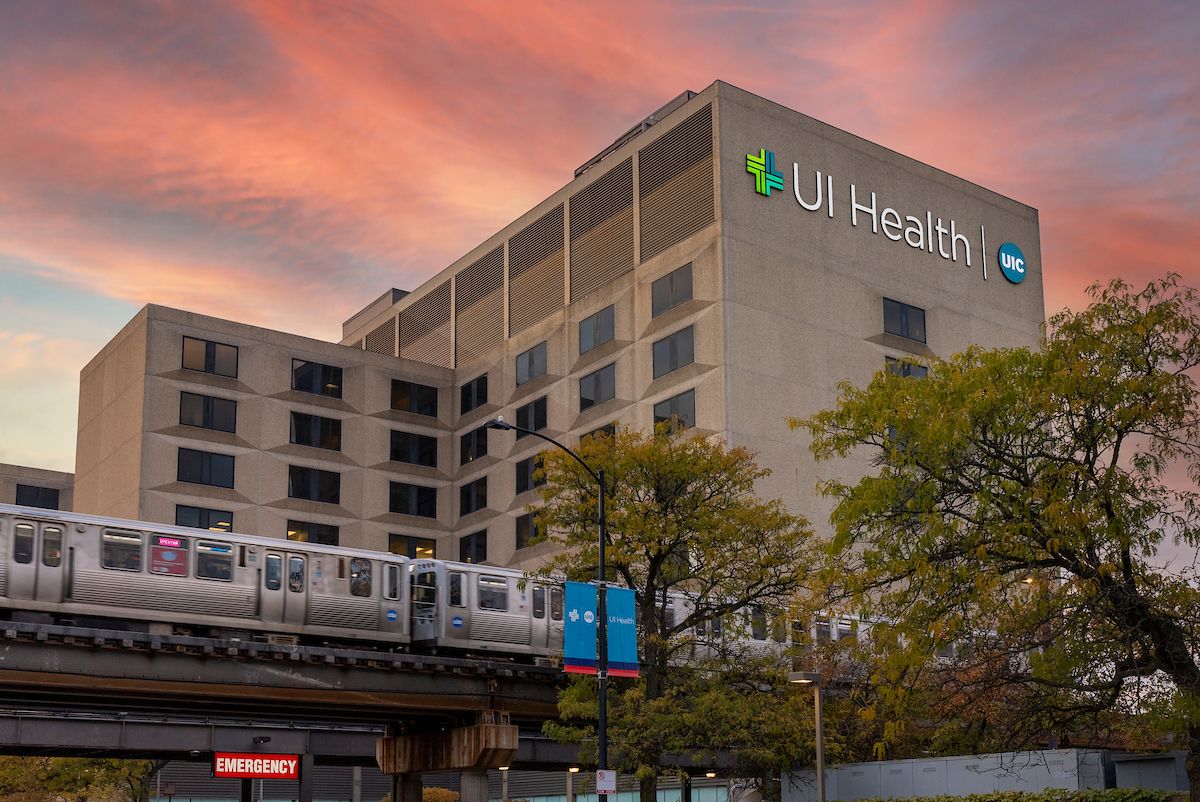Turning
the Tide

All too often, advances in cancer research widen existing health disparities. Thanks to an innovative approach called equitable precision oncology, the University of Illinois Cancer Center is working to develop and deliver care that leads to the best possible outcomes — for everyone.
In one sense, Laytunya Culverson’s story exemplifies the health inequities among populations in Chicago — and across the United States. In early 2020, the 55-year-old Bronzeville resident became ill.
Soon, she’d learn she had stage 4 colorectal cancer.
Black patients have a 15% greater incidence of colorectal cancer than non-Hispanic white patients, and they’re 34% more likely to die of the disease, according to a 2023 report from the American Cancer Society.
More than half of this difference in mortality rate can be attributed to Black patients being diagnosed at later stages. These cancer deaths contribute to the 16-year difference in life expectancy between those who live in the Loop and those who live on Chicago’s West and South sides.
But Culverson’s story had a happy outcome.
She’d already received life-saving care at UI Health twice before — for an aneurysm in 1999 and kidney disease in 2007. So when new symptoms emerged, her family encouraged her to seek care once again.
Now, after receiving treatment at UI Health again, she’s healthy and back to spending time with family and friends.
Laytunya Culverson at the UI Health Cancer Center. Courtesy: UI Health
Laytunya Culverson at the UI Health Cancer Center. Courtesy: UI Health
“The cancer center has been a blessing to me,” Culverson says. She’s especially grateful to her medical oncologist, Shikha Jain, MD, FACP, and surgeon Pier Cristoforo Giulianatti, MD. “I can’t explain how good they have been to me, and how much they care about each person.”
That patients like Culverson have access to comprehensive, compassionate care for their malignancies — and feel safe and comfortable seeking it — isn’t by accident.
It’s inherent to the mission of the University of Illinois Cancer Center.
There, patients from underserved populations receive the latest therapies, and the community is involved in every aspect of cancer research and treatment.
“Our science and our approach to care give voice to the voiceless,” says VK Gadi, MD, PhD, deputy director of the Cancer Center. “Not a voice through communication but through their participation in science. In this way, they can speak and we can work to change perspectives and outcomes nationally.”
Science for Everyone
Cancer treatment has taken dramatic leaps forward in recent years. Thanks to genetic, molecular, and cellular therapies—including those that can train the immune system to fight tumors— treatments are often tailored to an individual patient, says Jan Kitajewski, director of the University of Illinois Cancer Center and professor and head of UIC’s Department of Physiology and Biophysics.
This approach is called precision oncology. And while it’s increasingly effective, patients in marginalized communities are often shut out, with damaging effects.
“If precision oncology is only designed for those who can afford it, for those who fit in a certain class, then it will cause greater disparities,” Kitajewski says.
The Cancer Center takes a different approach, one called equitable precision oncology. That means involving the community and including diverse patients in each phase of research.
UI Health's Outpatient Care Center's sky bridge. Photo: Jenny Fontaine
UI Health's Outpatient Care Center's sky bridge. Photo: Jenny Fontaine
In addition to genetics, researchers and clinicians consider environmental risks and lived experiences in their work. That way, new treatments will be effective for everyone and lead to equitable outcomes.
All this starts from the beginning, as community input drives the research agenda. The Cancer Center has 220 community partnerships, and as part of UI Health, interacts with patients through the Mile Square network of federally qualified health centers (FQHCs).
Clinicians and researchers listen to patients’ needs, searching for solutions to challenges identified by the community.
“Where are the cancers more severe? Are people coming in in one neighborhood with early-stage cancer that would be treated with a certain type of drugs, or are they coming in with a late-stage, difficult-to-treat cancer?” Kitajewski says. “Science needs an appreciation for all the features that make us different, including our socioeconomic status, our nutritional component, our genetics, our ability to access care.”
Cancer health equity is central to our research, care, and community outreach and engagement at the University of Illinois Cancer Center.
When new therapies are ready for testing, the Cancer Center works with pharmaceutical companies to design clinical trials at UIC.
“By writing the trials, we can assure that the trial inclusion and exclusion criteria do not marginalize patients from diverse groups,” Kitajewski says. “This is quite important, because many trials are written in a way that automatically marginalizes some patients over others.”
Only about 7% of cancer patients overall participate in clinical trials, according to a report in the Journal of Clinical Oncology, and globally, the vast majority are white. But not at UIC. Here, 80% of participants in treatment clinical trials at the Cancer Center are Black or Latinx.
This ensures that the newest treatments will work in those patients close by — and also in underrepresented populations around the world.
Connecting to Community
Jerome Wiser is happy to be one of UIC’s clinical trial participants. His physician, Karine Tawagi, MD, who is part of the Cancer Center, talked with him about combining hormone treatments and radiation for his cancer.
Dr. Karine Tawagi of the Hematology and Oncology departments at UI Health. Photo Courtesy: UI Health.
Dr. Karine Tawagi of the Hematology and Oncology departments at UI Health. Photo Courtesy: UI Health.
“We’re always trying to improve the standard of cancer treatment as it is today,” Tawagi says. “The only way that we can do that is through research studies where we’re going to do the standard of care and maybe add something on top of it.”
The treatment combination may improve Wiser’s outcomes even as it helps others. And because he trusted his physician, the Cancer Center and UI Health, Wiser felt confident in his decision to participate.
“They made me feel relaxed because they understood how I felt,” he says. “It was like we are personal friends. So that’s why I went into the study, and I’m very glad I did.”
He’s looking forward to a long, healthy life, and hopes to inspire future patients to do the same. Relationships like these take time and effort, and the groundwork begins long before a patient needs to seek care.
“For more than 30 years, the Cancer Center has earned the trust of the communities we serve,” says Yamilé Molina, MS, MPH, PhD, associate director for community outreach and engagement at the Cancer Center. “Community work takes time and resources. You need to grow your staff and empower advocates in every neighborhood. You need to go out again and again—so often, in fact, that you become part of the community. When you shed the institutional or ‘ivory tower’ reputation, you are finally able to start building trust. We have that trust.”
In this Portrait of Health Equity, Dr. Yamilé Molina talks about their approach to centering community in the pursuit of cancer health equity, the importance of emphasizing community resilience, and how their life experiences have inspired their community-centered research.
One way these bonds are built is through leaders within the community. Illinois State Rep. Marcus C. Evans Jr., a cancer survivor himself, serves as a Community Advisory Board member for the Cancer Center. In that role, he helps guide strategic planning, advises on research priorities, and reviews clinical trials, among other tasks.
His office also helps disperse Cancer Center materials to the people he represents, many of whom face barriers to information and care. They may not realize what they can do to prevent cancer or know that UI Health serves everyone, regardless of their ability to pay or provide proof of insurance.
Evans, and others like him, can share evidence-based resources in a way that matches constituents’ needs and concerns.
“I want everybody who gets a cancer diagnosis to make it through,” Evans says. “As a cancer survivor, you have to be active in helping others survive, and all the work that we’re doing now is producing better results for our communities.”
Merging Equity and Expertise
Equitable precision oncology also requires world-class faculty. Fortunately, the Cancer Center brings together more than 260 renowned cancer researchers and clinicians from colleges and schools across the university.
Collectively, they have more than $35 million in active cancer-focused grants. Their passion, commitment, and wide-ranging expertise—in cancer biology, genetics, cellular science, and public health—all benefit vulnerable cancer patients.
And, they’re also training the next generation of researchers and clinicians, including those directly from the communities UIC serves. A partnership with the UI College of Medicine brings in high-quality, diverse trainees and staff members.
Nationwide, the College graduates more Latino physicians than any other school, and ranks in the top five for Black graduates.
Graduates during the 2024 College of Medicine Spring Commencement. Photo: Martin Hernandez
Graduates during the 2024 College of Medicine Spring Commencement. Photo: Martin Hernandez
In the past five years alone, more than 430 early-stage investigators — 39% of them from underrepresented groups — have trained here.
Many trainees export the philosophy of equitable precision oncology to facilities worldwide, including leading cancer institutions. But some stay on. Ryan Nguyen, D.O., completed his fellowship at the Cancer Center and is now a physician, assistant professor and researcher in hematology & oncology.
Recently, Nguyen brought a groundbreaking clinical trial for a new immune therapy for late-stage squamous cell carcinoma to UIC. That means local patients will have access to the treatment, and also that data about its safety and effectiveness will be inclusive of a diverse population.
“This is an amazing place to work,” Nguyen says. “We’re focused unapologetically on cancer health equity. It’s not just a byproduct of what we do here. Equity is our reason for being.”
All this makes the Cancer Center among the top National Institutes of Health (NIH)-funded minority-serving institutions nationally. In response to the National Cancer Institute’s (NCI) invitation, the Cancer Center applied for NCI designation, and hosted its committee for a site visit.
If accepted, it will become one of just 73 elite designated cancer centers nationally.
Such external recognition comes as a validation of the excellence patients already experience. Take Marta Soto, who began having anxiety attacks and high blood pressure in early 2023. In the emergency room, doctors checked her heart and did a CT scan, which revealed a nodule in her left lung.
“It was a shock,” she says.
After surgery to remove a large portion of her lung, she went to Nguyen to discuss the next steps. He suggested chemotherapy and, if she chose, participation in a clinical trial of a promising new treatment.
After careful consideration, she decided to enroll. “I’m going to hold on to anything that I can that is there for me to be able to survive,” she says. The knowledge that she’d help others also made her feel positive about the possibilities.
Months later, Soto is now cancer-free. That such a powerful treatment was available in her backyard, and delivered with such compassion and empathy, struck her as nothing short of miraculous.
“I even give them a name, my medical team,” she says. “They are my UI Health angels.”







